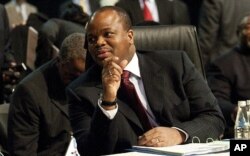Civil society and pro-democracy groups have called on parliamentarians in Swaziland to scrap debates on three proposed amendments that they say would further erode the fundamental human rights of citizens in the southern African kingdom.
Parliament is debating the amendment of the public order act, the professional terrorism act and the police act.
The proposal for the public order act of 1973 states that groups of at least 15 people cannot convene without first giving reasons for the meeting, presenting the agenda and getting permission from the commissioner of police.
Wandile Dludlu, national coordinator for a pro-democracy group known as the Swaziland United Democratic Front (SUDF), says the law already restricts freedom of movement and expression, and that the amendment would make things worse for the public.
"If the commissioner thinks and believes the agenda may pose a threat to national security or public order and public interest, he has a right — according to this [proposed] law — to stop the meeting," Dludlu said.
Supporters rejected critics’ concerns, saying King Mswati III's government has the constitutional mandate to protect citizens from chaos and instability. They also said the law is needed to ensure that security agencies have the necessary legal backing to do their jobs.
Dludlu, however, said the government is in violation of the bill of rights, which guarantees freedom of movement. The proposed law, he said, is pre-colonial and will cause dissent in the kingdom.
"It is totally unnecessary to … have an act that restricts so irrationally and unreasonably the freedom of movement to a point that it gives power to an appointee … to determine our rights, which among others are fundamental rights of freedom of movement and expression," Dludlu said.
Professional terrorism act
The professional terrorism act being considered in parliament enables the government to describe anything it finds unpleasant as terrorism, pro-democracy groups say.
Critics fear the move will criminalize activities of all civil society and pro-democracy groups, including demonstrations and protests against policies of the government.
"We believe it is too broad, making almost everything that may be deemed anti-government to be a terrorist act," Dludlu said. "For instance, this act says that if you are wearing a T-shirt of an opposition, that may be viewed or taken as terrorism. … We think this is an abuse of the anti-terrorism treaty that the world has and it is being used to deal with dissent in the context of Swaziland."
But supporters of the government say there is a need for anti-terrorism laws to empower security agencies as part of the global war on terrorism.
Police act
Parliament also is debating the police act, which seeks to ban police officers from forming a union.
Opposition groups say it is almost certain the amendments will become law because most lawmakers will not defy the king and his administration.
Civil society and pro-democracy groups plan to use the May 1 workers day to rally against the amendments. The groups also plan to petition the international community to pressure the government to scrap the amendments.
"We intend to use this day to raise more awareness specifically around these laws,” Dludlu said.





